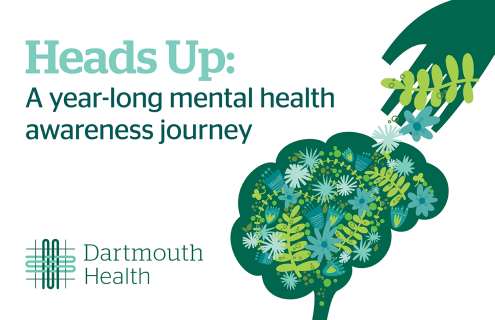
Every month, as part of a year-long effort to raise awareness of the issues and dispel the myths that lead to stigma, Dartmouth Health expert panelists and partners at the New Hampshire Union Leader and Seacoast Media Group have been focusing on different topics around mental health. This month, we explore the public policies which have shaped our current mental health system and the ways in which the state and federal regulatory framework as well as government funding can be leveraged to improve access to high quality care close to home for all who need it.
The realm of public policy may seem like a detour into the arcane for some, but, in many ways, it determines life and death outcomes; it can raise or lower barriers to our ability and that of our friends and loved ones to access critical, sometimes lifesaving care. The historic deficiencies in our mental health systems are due in large part to policies reflecting the longstanding cultural stigma around mental illness.
While undoing the stigma and reshaping our cultural awareness and perceptions around mental health must be done at all levels of society, we at Dartmouth Health know that certain changes also need to happen with state and federal regulations to create the stigma-free society we hope to see, provide equitable care to people who suffer with mental illness and support for their families, friends, employers and others close to them.
In recent years, things have been moving in the right direction, according to Will Torrey, a psychiatrist and the head of the Department of Psychiatry at Dartmouth Health.
“Increasingly, people are seeing how important mental health and substance use care is, both for children and adults,” Torrey said. “And with that understanding, many people are partnering to sort out how to provide more care, including clinicians, healthcare organizations, employers, state government, and people working on policy.”
Policies in the United States have made great strides, such as the creation of 988, the Suicide and Crisis Lifeline, but as Holly Stevens, the director of public policy at the National Alliance on Mental Health’s New Hampshire chapter (NAMI NH) points out, even that important resource has some wrinkles to iron out.
“One thing that people need to know is that if they do not have a 603 area code for their phone, then they will not be connected to folks here in New Hampshire,” Stevens said. “We are working on that at the federal level to try to ensure people are directed to services closest to where they are. In the meantime, people can call the Rapid Response Access Point at 1-833-710-6477 to be connected to directly someone in New Hampshire.”
Other good policies like expanded telehealth, with insurance coverage and reimbursement for remote outpatient clinical care, were permitted in the Granite State under temporary rules during the COVID-19 pandemic. Happily, Dartmouth Health and other policy experts have succeeded in advocating to keep much of that system in place for mental health and addiction care post-pandemic.
Increasing Medicaid reimbursements is also a significant way to keep the mental health system afloat. Since many patients receiving mental health care are covered by Medicaid, it is important that providers receive Medicaid reimbursements to cover the costs of their services and allow them to increase capacity to meet the desperate clinical staffing need, according to Torrey. With improved community resources, fewer people will need to go to the emergency room and hospitals will be able to discharge people to the right level of outpatient care.
“It’s very difficult to gain timely access to high quality outpatient or inpatient treatment. This puts a major strain on everyone, especially the person seeking care,” Torrey said. “Strengthening the system involves supporting the community mental health centers to build out their capacity. They have to be sound financially, and they should be supported to have an array of services, including supported housing, supported education and supported employment.”
Torrey said Dartmouth Health and NAMI NH are partnering via a state contract to provide assistance to community mental health centers as they build-out research-supported care for people who develop their first episode of psychosis. The care that has been shown to work for people with this difficulty entails team-delivered care with integrated mental health care, support for families, and effective medication advice. The treatment helps people develop the skills and knowledge they need to manage their illness and get in the driver’s seat of their lives. Investing right at the start improves the trajectory of peoples’ lives, Torrey said.
Torrey and Stevens discuss the current state of the mental health system in New Hampshire and areas that can be improved as panelists in a new Heads Up webinar hosted by Dartmouth Health. It can be viewed on our Heads Up: A Year-long Mental Health Awareness Journey page.